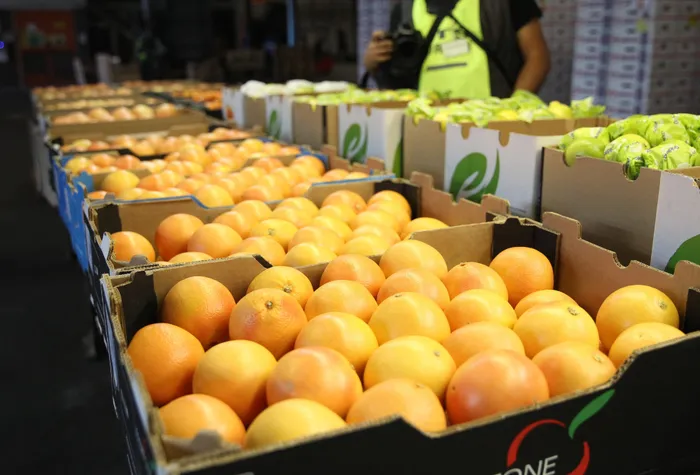Citrus and Wine industries plead with Ramaphosa for protection from looming tariffs
TARIFFS

The Citrus Growers Association of Southern Africa (CGA) in a statement said they want an exemption for seasonal fresh produce from US President Trump tariff.
Image: Doctor Ngcobo / Independent Newspapers
As US President Donald Trump's sweeping and wide spread tariffs close in on South Africa, the citrus and wine industries have called for action to be taken by President Cyril Ramaphosa to stave off the detrimental effects it could have on them.
On Monday, the wine industry said that South Africans should double down on supporting the local wine industry to offset the 30% tariffs that the United States government has slapped on South African wine exports.
The industry stated that the tariffs threaten to erode the gains the local wine industry has achieved in the bumper harvest of 2025 and will potentially haemorrhage the jobs in the wine industry ecosystem.
Eustace Mashimbye, Chief Executive Officer of Proudly South African said, "Spurred by favourable preferential trade terms from the African Growth and Opportunity Act (AGOA), South African wine exports to the United States enjoyed zero tariffs and propelled the United States to become South Africa’s fourth-largest wine export market by value after the United Kingdom, Germany, and the Netherlands."
According to the figures released by the South African Wine Industry Information and Systems (SAWIS), approximately R600 million worth of wine was exported to the United States in 2024.
“The 30% tariffs on South African wine exports to the United States don’t bode well for the viability, margins, and jobs in the wine industry. We must look for alternative markets, which is a laborious process that takes time. Currently, the most viable market is us. As consumers, hoteliers, restaurant owners and liquor traders, we have an opportunity to buffer this important industry against the looming headwinds by ramping up support for local wine winemakers,” said Mashimbye.
“Over and above showcasing the finest wines from emerging wine makers, the Local Wine Expo also fosters national pride and showcases career and entrepreneurial opportunities that are available in this space," she said.
Meanwhile, the Citrus Growers' Association of Southern Africa (CGA) said it wrote to President Cyril Ramaphosa, asking for urgent action on behalf of rural communities in the Northern and Western Cape where citrus to the US is grown and whose livelihoods are reliant on US-SA citrus trade.
"This week, with the tariff deadline on Friday, is one of great anxiety for the citrus growers in the Western and Northern Cape. These two provinces annually export about 7 million cartons to the US," said Dr Boitshoko Ntshabele, CEO of the CGA.
The CGA said it asked President Ramaphosa to urgently facilitate an extension of the current 10% US tariff beyond 1 August, which would allow for negotiations toward a mutually beneficial trade agreement.
The CGA also requested that, if a general extension of the deadline is not possible, an urgent request for a specific extension for seasonal fresh produce should be secured. Seasonal fresh produce is perishable and cannot be stored for extended periods, like other trade products.
The midpoint of the 2025 export season has just been passed, which means hundreds of thousands of cartons of citrus are ready in packhouses to be shipped to the US over the next few weeks. The implementation of a 30% tariff on 1 August will mean most of this fruit will be left unsold.
South African citrus growers do not pose a threat to US growers or jobs, as the produce sustains demand when local US citrus is out of season, benefiting US consumers.
"Citrus as a source of nutrition also helps to keep America healthy. Should we not be able to secure a favourable trade deal, or the concession for fresh produce, local job losses before the next season will be a certainty," added Dr Ntshabele.
Gerrit van der Merwe, Chairman of the CGA, said, "Being a grower in Citrusdal, I am very worried about the effect the tariffs will have on our town and the wider Cederberg municipality. Citrus forms the economic heart of the area. Not just farmers and farm workers will feel the impact, local businesses and even the funding of social support programmes will be affected as well. The social fabric of some rural towns in the Western and Northern Cape is being threatened."
"Local growers have also said that a 30% tariff could not only stifle future growth, but lead to the eventual destruction of between 500 and 1000 ha that would simply become unprofitable," Van der Merwe added.
BUSINESS REPORT